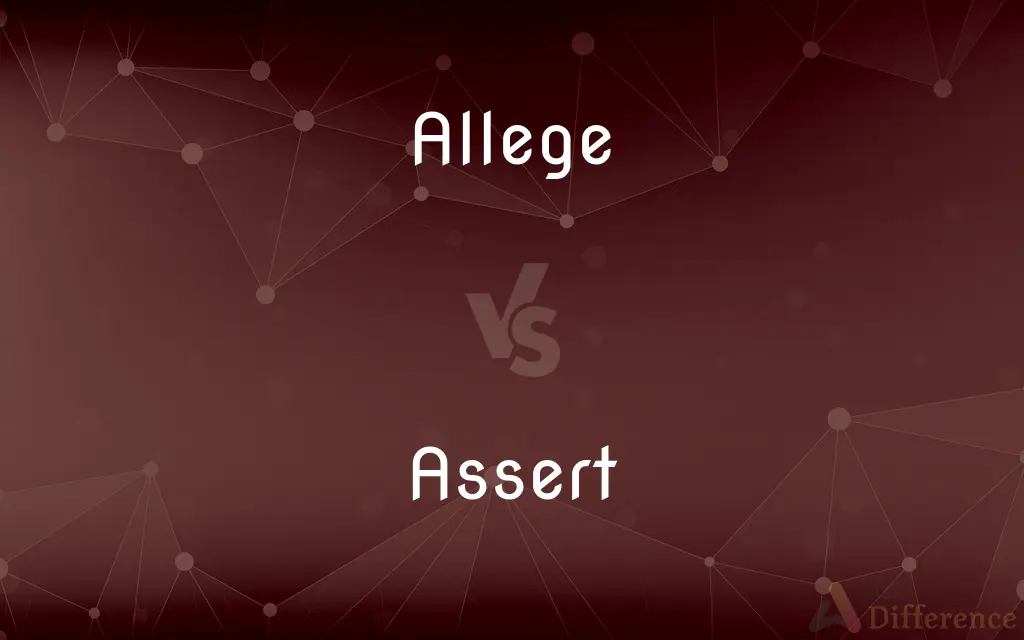Allege vs. Assert — What's the Difference?
By Fiza Rafique & Urooj Arif — Updated on April 4, 2024
Allege typically means to claim without proof, often in legal contexts, while assert involves stating something confidently and forcefully as a fact.

Difference Between Allege and Assert
Table of Contents
ADVERTISEMENT
Key Differences
Allege is to claim or declare something is true without providing evidence, often used in legal and formal contexts where the truth of the statement is yet to be proven. Whereas, to assert means to state something confidently and forcefully as a fact, implying a stronger sense of certainty and often accompanied by evidence or conviction.
When someone alleges, they might be initiating a claim or accusation, possibly pending investigation or proof. On the other hand, asserting is often an act of expressing one's conviction towards a fact or belief, demonstrating confidence in its truth.
Allegations are commonly found in the early stages of legal disputes or criminal cases, where claims are made but not yet substantiated. In contrast, assertions can be found in arguments, debates, or discussions where one is making a point with a degree of certainty and often after gathering facts.
The connotation of alleging is somewhat tentative, as it suggests that the claim is subject to further verification. Asserting, however, carries a connotation of firmness and authority, indicating that the speaker believes in the veracity of their statement.
In terms of evidentiary support, allegations do not necessarily require immediate proof and may precede the gathering of evidence. Assertions, by their nature, suggest that the speaker has already considered the evidence or believes strongly enough in their claim to state it as fact.
ADVERTISEMENT
Comparison Chart
Definition
To claim something is true without proof
To state something confidently as a fact
Context
Often legal or formal, where proof is pending
Any context, especially in arguments or when evidence is presented
Connotation
Tentative, subject to verification
Confident, indicating belief in truth
Evidentiary Support
Not required at the time of statement
Implied or explicitly backed by evidence or conviction
Usage
Early stages of disputes or accusations
Making a point with certainty, often after consideration of facts
Compare with Definitions
Allege
To claim or assert something is true without immediate proof.
The plaintiff alleged negligence on the part of the defendant.
Assert
Used in arguments, discussions, or when one is confident in the truth of their statement.
She asserted her rights during the negotiation, refusing to be undermined.
Allege
Often used in legal contexts where claims are made before being proven.
In the initial complaint, it was alleged that the company had violated several regulations.
Assert
Carries a sense of confidence and authority.
He assertively stated his opinion, leaving no room for doubt.
Allege
Implies a degree of uncertainty, awaiting proof.
The journalist alleged corruption within the government, sparking an investigation.
Assert
Broad, from formal arguments to everyday affirmations of belief.
He asserted his innocence in spite of the accusations.
Allege
Does not require proof at the moment of the claim.
He alleged fraud, though documentation to support his claims was yet to be presented.
Assert
Often backed by evidence or strong belief.
The lawyer asserted that the evidence was incontrovertible.
Allege
More formal, typically related to accusations or claims.
Allegations of misconduct were brought against the officer.
Assert
To declare something confidently as a fact, often with evidence or conviction.
The scientist asserted that the new data confirmed her theory.
Allege
Claim or assert that someone has done something illegal or wrong, typically without proof
He alleged that he had been assaulted
He is alleged to have assaulted five men
Assert
To state or express positively; affirm
Asserted his innocence.
Allege
To assert to be true; affirm
Alleging his innocence of the charge.
Assert
To defend or maintain (one's rights, for example).
Allege
To assert prior to a final determination
The indictment alleges that the commissioner took bribes.
Assert
To put into action boldly; employ or demonstrate
Asserted her independence.
Allege
To state (a plea or excuse, for example) in support or denial of a claim or accusation
The defendant alleges temporary insanity.
Assert
To declare with assurance or plainly and strongly; to state positively.
He would often assert that there was life on other planets.
Allege
(Archaic) To bring forward as an authority.
Assert
To use or exercise and thereby prove the existence of.
To assert one's authority
Salman Rushdie has asserted his right to be identified as the author of this work.
Allege
To state under oath, to plead.
Assert
To maintain or defend, as a cause or a claim, by words or measures; to vindicate a claim or title to
To assert our rights and liberties
Allege
(archaic) To cite or quote an author or his work for or against.
Assert
(reflexive) To insist on the legitimacy of one's rights, opinion, etc; not to allow oneself to be dismissed; to ensure that one is taken into consideration; to make oneself respected; to be assertive.
Since going to therapy, I've found it much easier to assert myself.
Allege
(transitive) To adduce (something) as a reason, excuse, support etc.
Assert
(programming) To specify that a condition or expression is true at a certain point in the code.
Allege
(transitive) To make a claim as justification or proof; to make an assertion without proof.
The agency alleged that my credit history had problems.
Assert
(electronics) To set a signal on a line using a voltage or electric current.
Allege
(obsolete) To lighten, diminish.
Assert
(computer science) an assertion; a section of source code which tests whether an expected condition is true.
Allege
To bring forward with positiveness; to declare; to affirm; to assert; as, to allege a fact.
Assert
To affirm; to declare with assurance, or plainly and strongly; to state positively; to aver; to asseverate.
Nothing is more shameful . . . than to assert anything to be done without a cause.
Allege
To cite or quote; as, to allege the authority of a judge.
Assert
To maintain; to defend.
That . . . I may assert Eternal Providence,And justify the ways of God to men.
I will assert it from the scandal.
Allege
To produce or urge as a reason, plea, or excuse; as, he refused to lend, alleging a resolution against lending.
Assert
To maintain or defend, as a cause or a claim, by words or measures; to vindicate a claim or title to; as, to assert our rights and liberties.
Allege
To alleviate; to lighten, as a burden or a trouble.
Assert
State categorically
Allege
Report or maintain;
He alleged that he was the victim of a crime
He said it was too late to intervene in the war
The registrar says that I owe the school money
Assert
To declare or affirm solemnly and formally as true;
Before God I swear I am innocent
Assert
Insist on having one's opinions and rights recognized;
Women should assert themselves more!
Assert
Assert to be true;
The letter asserts a free society
Common Curiosities
What does it mean to allege something?
To allege means to claim that something is true without providing proof at the time of the claim, often awaiting verification.
Why is the distinction between allege and assert important in legal contexts?
Because alleging suggests claims are yet to be proven, while asserting suggests confidence in the facts, impacting the strength and perception of legal arguments.
Is asserting stronger than alleging?
Yes, asserting is generally considered stronger because it is backed by confidence, conviction, or evidence, whereas alleging is not necessarily supported by proof.
Can an allegation become an assertion?
Yes, if an allegation is later backed by sufficient evidence, it can become an assertion of fact.
Can anyone allege or assert?
Yes, both actions are available to anyone, but the context and basis for each vary, with legal and factual considerations playing significant roles.
Why do people allege rather than assert in legal complaints?
Because initial legal complaints often precede the full gathering of evidence, so allegations are made to outline claims that are subject to future proof.
Is alleging negative?
Not inherently, but it can carry a negative connotation depending on the context, especially if the allegations are of a serious nature.
Can an assertion be false?
Yes, assertions can be false if the individual making the assertion is mistaken or misleading others, despite their confidence.
How is asserting different from alleging?
Asserting involves stating something with confidence and force as a fact, usually backed by evidence or strong belief, unlike alleging which doesn't require immediate proof.
What role does evidence play in asserting?
Evidence is crucial in supporting an assertion, providing the basis for the confident claim of truth.
Can alleging without evidence lead to legal consequences?
Yes, making unfounded allegations, especially if damaging, can lead to legal repercussions like defamation suits.
How can one transition from alleging to asserting?
By gathering sufficient evidence to substantiate the initial claims, thereby moving from tentative allegations to confident assertions.
How do you prove an allegation?
By gathering and presenting sufficient evidence to support the claim, turning it into an assertion of fact.
How do societal perceptions of alleging and asserting differ?
Alleging is often seen as preliminary and needing verification, while asserting is viewed as a definitive claim of truth, influencing how each is received by the public.
Does context affect whether one should allege or assert?
Absolutely, the choice between alleging and asserting depends on the available evidence, the nature of the claim, and the strategic considerations of the situation.
Share Your Discovery

Previous Comparison
Olla vs. Holla
Next Comparison
Clarinet vs. FluteAuthor Spotlight
Written by
Fiza RafiqueFiza Rafique is a skilled content writer at AskDifference.com, where she meticulously refines and enhances written pieces. Drawing from her vast editorial expertise, Fiza ensures clarity, accuracy, and precision in every article. Passionate about language, she continually seeks to elevate the quality of content for readers worldwide.
Co-written by
Urooj ArifUrooj is a skilled content writer at Ask Difference, known for her exceptional ability to simplify complex topics into engaging and informative content. With a passion for research and a flair for clear, concise writing, she consistently delivers articles that resonate with our diverse audience.














































